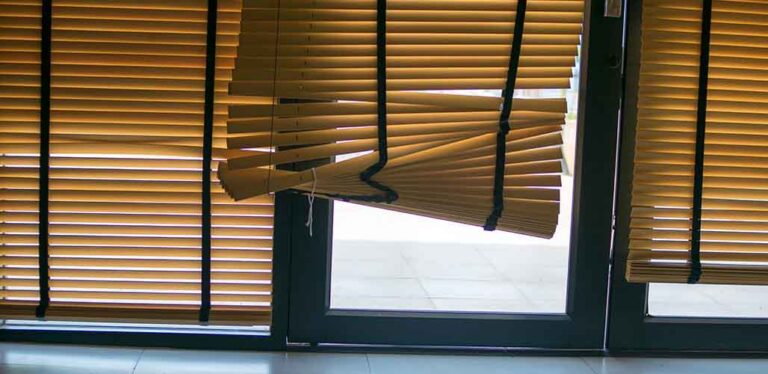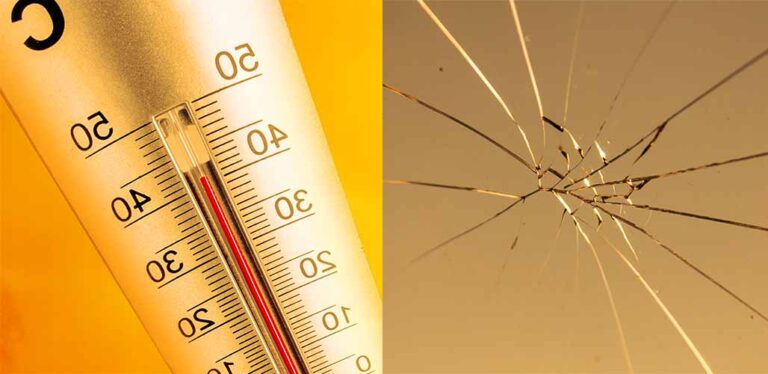Can Windows Crack on their Own?
Can windows crack on their own? Unfortunately, yes! Windows break on their own with no good reason sometimes. Some of the most common causes that lead to a window to crack include temperature stress, physical stress, and even the shape of a window. Not all windows are the same strength. And, the way you treat your windows over time will play a part in how long they survive without cracking. So, today, I’ll take a closer look at why windows crack on their own, and some ways you can try to prevent this from happening.
Contents
- Can windows crack on their own?
- Why would a window randomly crack?
- What makes a house window crack?
- Can windows crack from the cold?
- Are stress cracks on windows preventable?
Can Windows Crack on Their Own?
It doesn’t always take something slamming into your windows to crack them. In fact, sometimes a cracked window can seem to come from nowhere. But, there are a lot of experiences that will weaken our windows over time, or that will impact the glass in your windows without you noticing until a crack appears.
Cracked windows are frustrating, because they are tough to fix, and usually require a full replacement. And, since windows can crack on their own, it might seem like there’s nothing you can do to prevent this unfortunate circumstance. But, knowing what factors can cause windows to crack can help you protect them before they happen.
Why Would a Window Randomly Crack?
Though it can seem like windows crack by themselves with no cause, there are several things that can prompt cracking. This includes changes in temperature, improper care, and even poor care before they were installed in your home. Let’s take a closer look at each of these causes.
Stress
Stress is a leading cause of windows cracking on their own. Extreme temperature changes are to blame for stress cracks on windows. Unfortunately, stress cracks happen across the two portions of the window’s surface or between the outside and inside. Temperature-related stress is most common during winter when you adjust your central heating to heat your home. Given the freezing temperature outside and high temperatures inside, a combination results in enough stress that causes the windows to crack.
Fortunately, stress cracks are easy to spot and mostly don’t shatter the window completely. They start small near the window’s edge and continue growing across the windowpane’s surface if they go unnoticed.
Physical Stress
Physical stress can also make windows crack randomly. If you continuously slam your windows shut, they will sometimes suffer cracks. Poor window installations can cause cracks, moreso when the closing mechanism fails and gravity shuts them too hard, thus causing panes to crack.

Pressure
Pressure is another leading cause of windows cracking randomly. The pressure resulting from improper storage, transportation, and installation, interferes with the integrity of the windows, which causes them to crack and eventually break when in place.
Low or high-elevation improper installation of double or triple-glazed windows affects the glass pressure, thus causing cracks. Cracks emanate from the inconsistency between outside window pressure and the gas sitting between the window panes providing insulation. Moreover, erratic pressure changes in the atmosphere also cause windows to crack. Most window pressure cracks form a curved shape which is distinguishable.
Impact
Impact is another window cracks culprit. All related impact window cracks begin from a central point where the impact occurred. Identify the source of the impact (was it a ball, heavy window slamming, etc.) to understand the best way to address the cracks or window breakage. Weakening in windows may cause them to crack or break. Gradual weakening happens mostly to improperly installed windows.
Age and Shape
Other reasons that cause weakening include age, where windows that have been in place for over ten years start cracking thanks to weakening panes.
Shapes are another reason; narrow and tall windows cause more intense stress on the shorter edges of window panes; this, combined with age, causes them to weaken, thus giving way to window cracking.
Can a House Window Crack by Itself?
Contracts and expansion should be blamed for causing windows to crack by themselves. The expansion of the glass in thin sheets causes stress and eventual cracking. Differential expansion, glass vibration resulting from differential pressure that makes the glass expand or contract, also causes windows to crack.
The weight of the glass panels may cause the frame to either tighten or twist, applying pressure on the glass and causing it to crack. Additionally, strong winds and frequent window slamming contribute to window cracking. Defects can cause a window to crack by itself. Even when you install a window with a tiny defect. Thanks to the never-ending heating and cooling day and night cycles, the defect starts to expand over time. Within no time, your window will develop cracks and eventually break if you fail to address the issue.
Can Windows Crack from the Cold?
Yes! And as captured above, cracks occur when different levels of temperatures clash on the same window pane. Case in point; if outside temperatures are -30° or below, and you crack up your central heating to 70° F, expect a violent convergence where the two temperatures collide on the window glass. Older installed windows suffer the most from a collision of these temperatures, which cause varying pressure levels that make the windows crack.
In other instances, windows that get covered by snow which stays for more extended periods before melting, also often end up cracking. The ice makes the temperatures drop significantly because, unlike the rest of the house, the windows are in rooms/areas that are not heated. Windows in attics and basements suffer from this the most. The ice builds up, adding weight to the glass, and sudden temperature changes cause the glass to crack.
Is Stress Crack on Windows Preventable?
Unfortunately, stress cracks on windows are not entirely preventable. This is because stress cracks occur naturally thanks to temperature changes that expand and contract the glass on windows.
Thankfully, installing thicker glass (4mm) and opting for glass features that suit the climate in your region may lower the risks of windows suffering from stress cracks. If you have the time and finances, you can replace the standard 3mm glass with 4mm. You should also work with a professional to help you get the right glass and shade to counter the weather elements.
You can opt for different types of glass, such as; impact-resistant insulating glass, tinted insulating glass, laminated insulating glass, and tempered insulating glass. They are renowned for curbing thermal stress cracks on windows.
Can Windows Crack on their Own?
The three main reasons why windows crack include; thermal stress cracks resulting from sudden temperature changes. The other is impact cracks caused by stress from objects hitting the windows from a central point. Lastly, pressure cracks resulting from drastic pressure system changes that pressurized trapped air in between two glass panes. A collision of extreme temperatures (negative degrees outside and high temperatures inside) causes thermal stress cracks on windows. Installing thick or insulated glass can help you prolong the lifespan of the windows and avoid cracks.





